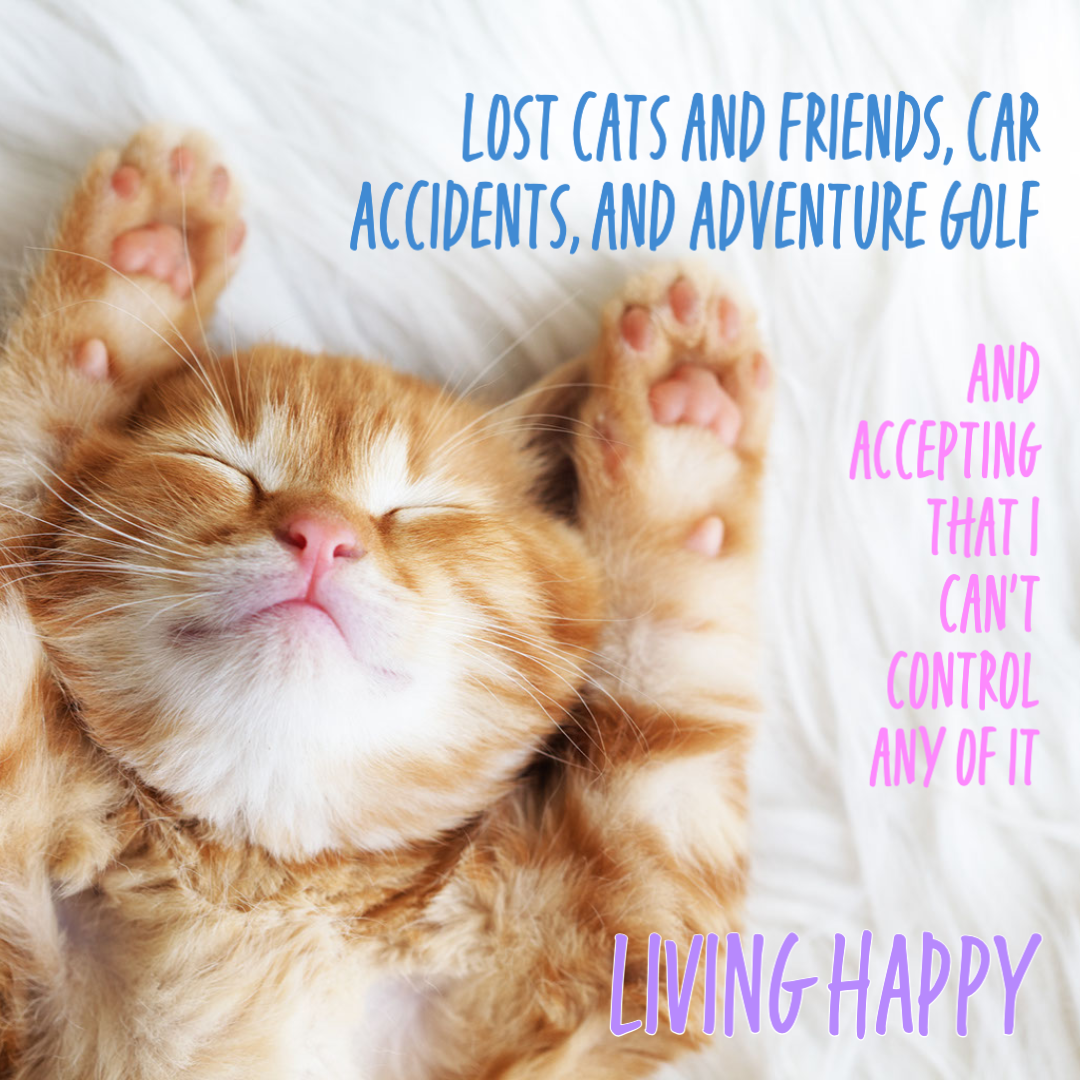Lost Cats and Friends, Car Accidents, and Adventure Golf
And accepting that I can't control any of it
This morning, I was at a mini-golf tournament where people were happily raising money for a local hospital, teasing each other about mulligans and swings, being a tiny bit competitive, mockingly pretending to Jon McEnroe their golf clubs when they failed to sink it in five by Blackbeard’s cave. Right by the pirate-themed adventure golf course, two cars collided. A Jeep’s front end smashed into the side of a turning car.
The crunch was huge.
Everyone stopped. Play paused.
A few golfers ran over to make sure people weren’t hurt and to wave traffic around. A minute passed and then another. And then another again. And then all the minutes that followed and would follow.
Play resumed. But the echoes of the accident was still there. So were the echoes of the playful moments before. All those moments where I tried to use just the power of my brain to get my orange ball in the hole and how I couldn’t magically control that ball at all.
That’s how life works.
LYRA
Once, Lyra, my cat, was gone for 36 hours.
We searched the house.
We searched outside.
We searched a lot.
Don was one of my best friends. He was Lyra's last cat sitter. The first time I ever talked to him I was working for the Ellsworth American. He was doing a project with the Alamo Theater (Yes, that is in my ancient book Girl, Hero), and we talked on the phone. It was one of the best times I've ever had on the telephone. The conversation was quick. It was strange. We talked about movie monsters and Bucksport, Maine. We talked about dungeons and cat tails.
I hung up and the reporter at the desk across from me said, "Who was that?"
And I said, "That was a strange, amazing man."
I meant strange in a good way. Strange in a quick-mind way. Strange in a gentle, quirky way. I meant strange in the best kind of way.
Don loved cats. He loved horror movies and 3D photography and martinis at the now nonexistent Cleonice. He took the most beautiful photos of people. He could always capture their loneliness and their love. I know this because we ended up working together. We worked together at the Ellsworth American. Later, he was my star reporter when I was a newspaper editor. He won a lot of awards for those photos.
The summer before Lyra went missing, he would drive me to doors for my campaign and we'd talk about the most bizarre things: dragon flies, made-up song lyrics, what it was like for him to be a bonus dad. He had this soft voice, very lyrical. He sang. He played guitar. He wrote a book about Tony Richardson. After the election we were going to start a theater group together. He'd just written a funny, snarky musical.
He died the day Lyra went missing. His wife's sister called me right after I posted on my blog about Lyra being missing.
He died and the world lost a strange, amazing man. His family lost a beautiful, amazing man.
Despite the fact that all that day we had searched every corner of the house, that next morning, Lyra appeared at the top of the basement stairs. She meowed at us. She didn't smell like outside or the basement. She wasn't cold. She kept meowing, trying to tell us the story of where she'd been.
We didn't understand.
She kept meowing and then she ate some food. Lyra not eating for 36 hours is a strange thing.
I'd like to think Don helped get her back somehow that he spoke to her softly about strange things and gave her some parting words of advice and love. Now, years later, Lyra is gone, too.
I wish we could all magically will the people (and dogs and cats) that we lose back.
CONTROL
In an old book of his, The Lost Grizzlies, Rick Bass writes, “When a grizzly cannot control its five hundred square miles, it reduces its range to an area that it can control, in order to survive.”
But the thing is that we can’t control all of it, can we? I’m pretty sure that I sometimes have trouble controlling just the range of my own body. Five hundred square miles? I wish that grizzly some luck.
We can’t always control mini-golf balls, the health or death of our friends, the crashing of cars, the wanderings of cats. We can just try to do our best, accept the chaos that happens, the loss that happens, and embrace the moments where things are beautiful and bright orange golf balls roll past pirate’s cutlasses and right into the perfect hole.
You can’t keep your eyes closed to only the good or only the bad in life, in moments, in friendships and love. You have to try to keep your eyes open and see the whole of things—the crashes, the friends who don’t return and the cats who do.
Michel de Montaigne wrote, “Every man bears the whole stamp of the human condition.”
We do.


